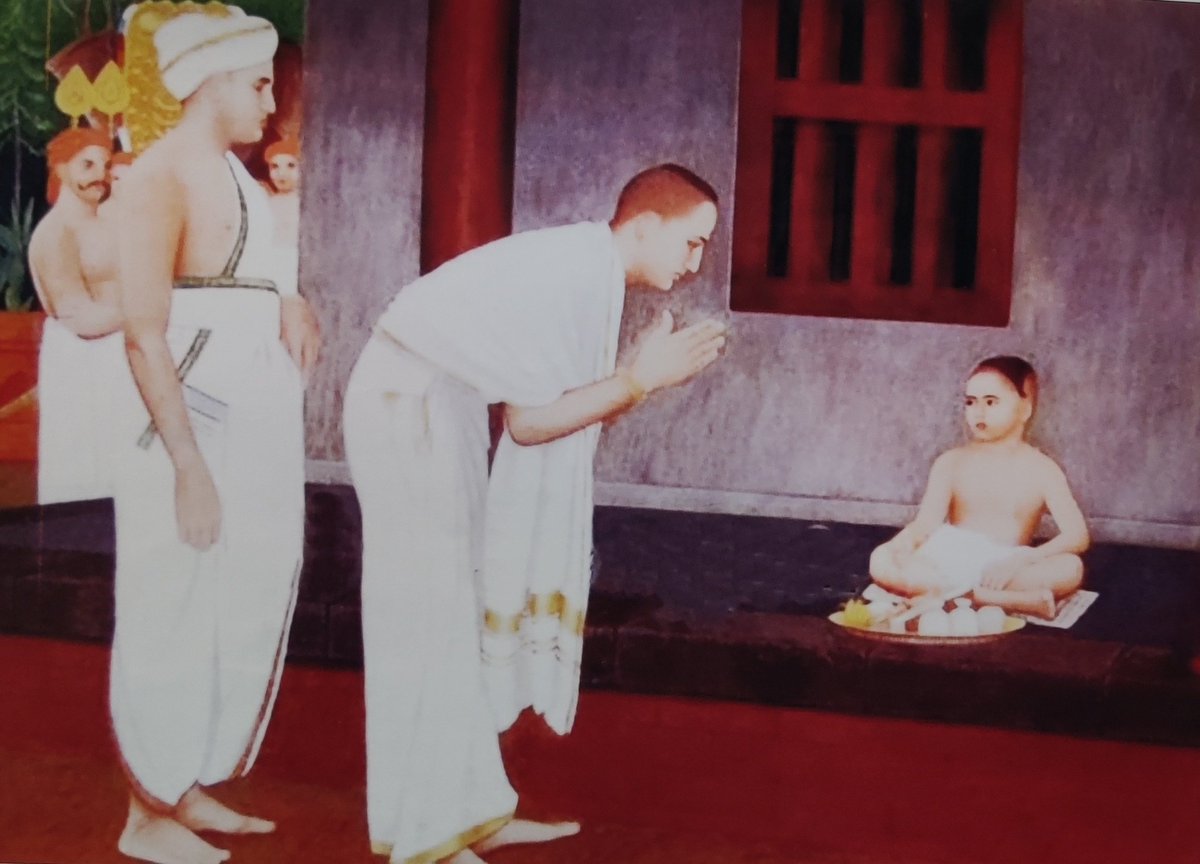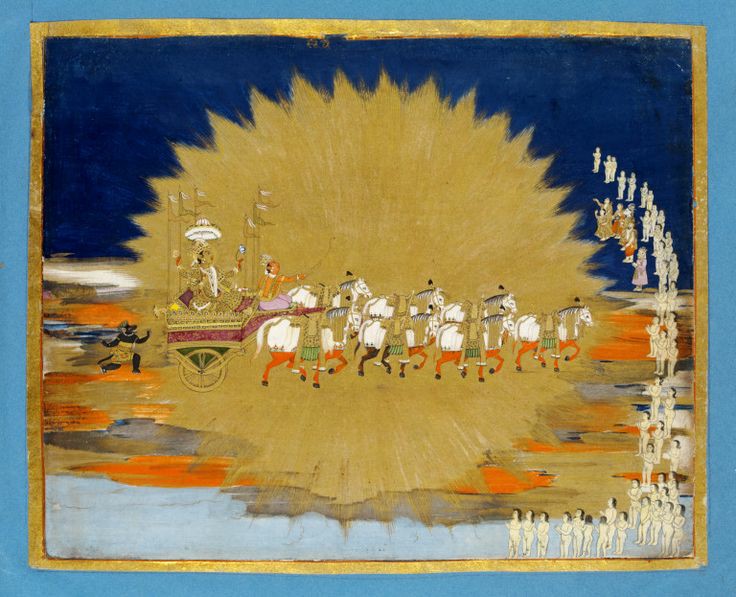
NĀRADA & HIS BHAKTI-SŪTRAS :
Bhakti – Love Divine :-
Of Love Divine (Sūtra 1 to 6)
All our philosophical textbooks are written out by the great 'rishis' and 'thinkers' in the form of sūtras.
The term, ‘sūtra’, means ‘string’ – the string on which the arguments &
#Thread
Bhakti – Love Divine :-
Of Love Divine (Sūtra 1 to 6)
All our philosophical textbooks are written out by the great 'rishis' and 'thinkers' in the form of sūtras.
The term, ‘sūtra’, means ‘string’ – the string on which the arguments &
#Thread

thoughts are strung together to become an enchanting garland of ideas.
This is the philosophy of devotion, of love for 'Paramatma' stands today attributed to the Devarṣi Nārada.
He works everywhere as friend, philosopher and guide, to all devotees.
Let's begin the journey !
This is the philosophy of devotion, of love for 'Paramatma' stands today attributed to the Devarṣi Nārada.
He works everywhere as friend, philosopher and guide, to all devotees.
Let's begin the journey !

NĀRADA & HIS BHAKTI-SŪTRAS :
Bhakti – Love Divine :-
Of Love Divine (Sūtra 1 to 6)
Sūtra 1
अथातो भक्तिं व्याख्यास्यामः॥ १॥
Now, the doctrine of devotion we shall expound.
After having developed all the qualifications necessary for the practice of devotion (atha), the student
Bhakti – Love Divine :-
Of Love Divine (Sūtra 1 to 6)
Sūtra 1
अथातो भक्तिं व्याख्यास्यामः॥ १॥
Now, the doctrine of devotion we shall expound.
After having developed all the qualifications necessary for the practice of devotion (atha), the student

feels no spiritual satisfaction, and therefore (ataḥ), he must now diligently walk the path of devotion. According to Rāmānuja, the teacher of viśiṣṭādvaita, there are seven qualifications necessary in a seeker who plans to pursue devotion. They are: 

(1) Discrimination in food (viveka), (2) Freedom from desire (vimukha), (3) Practice (abhyāsa), (4) Habit of doing good to others (kriyā), (5) Purity in thought, word and deed, non-violence, charity, and such other virtues (kalyāṇa), (6) Cheerfulness (anavasāda), and (7) Absence 

of excessive hilariousness (anuddharsa).
Sūtra 2
सा त्वस्मिन् परमप्रेमरूपा॥ २॥
That (devotion) is indeed of the nature of supreme love in (directed towards) God.
Devotion is defined in various ways by various teachers but to Devaṛṣi Nārada it is indeed ‘the supreme love for
Sūtra 2
सा त्वस्मिन् परमप्रेमरूपा॥ २॥
That (devotion) is indeed of the nature of supreme love in (directed towards) God.
Devotion is defined in various ways by various teachers but to Devaṛṣi Nārada it is indeed ‘the supreme love for

God.’ It depends upon nothing else. A mind totally turned towards God in love, demanding nothing, not even Liberation, is a mind filled with devotion. Thoughts constantly flowing in love towards the Supreme is devotion. Nobody else, nothing else, no one else, but Nārāyaṇa – this 

attitude of the heart is love.
Sūtra 3
अमृतस्वरुपा च॥ ३॥
The supreme love for the Lord, called devotion divine, is of the nature of immortality also.
Having described the devotion as ‘divine love for the Lord’, the teacher here adds that ‘it is also of the nature of
Sūtra 3
अमृतस्वरुपा च॥ ३॥
The supreme love for the Lord, called devotion divine, is of the nature of immortality also.
Having described the devotion as ‘divine love for the Lord’, the teacher here adds that ‘it is also of the nature of

immortality.’ In utter devotion when an individual lifts all his identifications from the realm of change into the contemplation of the changeless, immutable Lord, the constant agitations cease and therefore, all sense of mortality too vanishes. This constant experience of the 

changeless infinitude and the consequent equipoise lived by a true devotee is the state of immortality.
Sūtra 4
यल्लब्ध्वा पुमान् सिद्घो भवति। अमृतो भवति। तृप्तो भवति॥ ४॥
Having gained this supreme devotion, the devotee attains perfection & immortality and becomes extremely
Sūtra 4
यल्लब्ध्वा पुमान् सिद्घो भवति। अमृतो भवति। तृप्तो भवति॥ ४॥
Having gained this supreme devotion, the devotee attains perfection & immortality and becomes extremely

satisfied.
One who has discovered in himself the supreme devotion for the Lord, has gained in fact all that is to be gained.
To a true devotee of the Lord all these powers and gains are of no value at all. He rejects them as insignificant. In fact the great purāṇas often
One who has discovered in himself the supreme devotion for the Lord, has gained in fact all that is to be gained.
To a true devotee of the Lord all these powers and gains are of no value at all. He rejects them as insignificant. In fact the great purāṇas often

describe that the eight mighty powers (aṣṭasiddhis) await upon a true devotee, and they always follow at his heels devoutly begging him to make use of them. Here, the attainment (siddhi) is only the highest devotion for the Supreme. The Lord describes a true devotee: ‘One, who 

has given away his heart to Me, thereafter claims nothing other than Me – neither the state of Brahmahood, nor the throne of Indra, nor the emperorship, nor the kingdom, nor the cheap siddhis – nay, not even mokṣa does he come to demand'. 



Sūtra 5
यत्प्राप्य न किञ्चिद्वाञ्छति। न शोचति। न द्वेष्टि। न रमते। नोत्साही भवति॥ ५॥
When an individual gains the supreme joy of full devotion to the Lord, he comes to live in a sense of utter fulfilment, and he has therefore no more any desire for the things of the world.
To a
यत्प्राप्य न किञ्चिद्वाञ्छति। न शोचति। न द्वेष्टि। न रमते। नोत्साही भवति॥ ५॥
When an individual gains the supreme joy of full devotion to the Lord, he comes to live in a sense of utter fulfilment, and he has therefore no more any desire for the things of the world.
To a

true devotee all happenings are unimportant and extremely insignificant. He cares not for them. Things may come and things may go, joys may visit him, or sorrows may peep in his heart, but he ever lives in the maddening joy of Hari-devotion. 

Sūtra 6
यज्ज्ञात्वा मत्तो भवति। स्तब्धो भवति । आत्मारामो भवति॥ ६॥
Having known which (devotion) man becomes intoxicated, silent and enjoys in the self.
One who has gained this all consuming devotion becomes intoxicated, and therefore, ‘mad’ with his own Love Divine. He cannot
यज्ज्ञात्वा मत्तो भवति। स्तब्धो भवति । आत्मारामो भवति॥ ६॥
Having known which (devotion) man becomes intoxicated, silent and enjoys in the self.
One who has gained this all consuming devotion becomes intoxicated, and therefore, ‘mad’ with his own Love Divine. He cannot

behave as all others do in the world & due to his incapacity to conform to the usual mode and attitude of the worldly people, the members of the society brand him as ‘mad’. He sings the glory of d Lord always.He cries in ecstatic joy.
He laughs in his own floods of inner peace.
He laughs in his own floods of inner peace.

The palace of fulfilment is built on the highest peaks of satisfaction – no one can scale them and visit himthere, where he lives in divine luxury of infinite peace.
The devotee at this stage becomes unconsciously lifted into the states of deepest meditation, when the divine form
The devotee at this stage becomes unconsciously lifted into the states of deepest meditation, when the divine form

of the Lord alone has the exclusive chance to be in his heart.
Conclusion Remarks :-
Love is a link that connects, a force that attracts, a fascination that seizes, and a clasp that grasps. Therefore, when one establishes himself in the relationship of devotion with the Divine,
Conclusion Remarks :-
Love is a link that connects, a force that attracts, a fascination that seizes, and a clasp that grasps. Therefore, when one establishes himself in the relationship of devotion with the Divine,

he steps up into a realm of his own, having his own enchantments and personal experiences.
These opening six sūtras give us a general picture of divine devotion.
II नारायण नारायण नारायण II
These opening six sūtras give us a general picture of divine devotion.
II नारायण नारायण नारायण II

@RituRathaur @jananisampath @ikkmurugan @Mishti_in @shallakaul @youngndharmic @BeenaPP1 @first_desi @KashmiriPandit7
@jyotikarma7
@aneelgs @slickindo @vparamaguru1 @armykafan @jyoitas
@sampadamishra
@tiwarinivedita @nsspramod
@krishnadharma
@dharma_ramani @madhvahistory
@jyotikarma7
@aneelgs @slickindo @vparamaguru1 @armykafan @jyoitas
@sampadamishra
@tiwarinivedita @nsspramod
@krishnadharma
@dharma_ramani @madhvahistory
@Manushi64428902
@mahesh8524 @ignisfatuus1110
@LostTemple7 @desi_thug1 @InfoVedic @geetaraavi @MNageswarRaoIPS @Isha_Sattva @itishree
@kachnarr @ayushJ_1604 @kr_ratansinghs @dil_se_ree @drvikaspadha @naive_rookie @apparrnnaa @lokagatha @pokaabhii @mahakal_k_bhakt
@mahesh8524 @ignisfatuus1110
@LostTemple7 @desi_thug1 @InfoVedic @geetaraavi @MNageswarRaoIPS @Isha_Sattva @itishree
@kachnarr @ayushJ_1604 @kr_ratansinghs @dil_se_ree @drvikaspadha @naive_rookie @apparrnnaa @lokagatha @pokaabhii @mahakal_k_bhakt
@rajeaiyer @bhat200
@RamFcSoni
@chalotweetkaro
@adityar96542358 @rajeshpushkarji @besurataansane
@BangadVedant @Manasi71 @IndiaTales7 @BharadwajSpeaks
@BharathiKumar4 @Murthy_sowjanya @jaythirdattempt @i_ragvendra @tvitterministry @moolyacoin @krishna76435679 @katti_mohan
@RamFcSoni
@chalotweetkaro
@adityar96542358 @rajeshpushkarji @besurataansane
@BangadVedant @Manasi71 @IndiaTales7 @BharadwajSpeaks
@BharathiKumar4 @Murthy_sowjanya @jaythirdattempt @i_ragvendra @tvitterministry @moolyacoin @krishna76435679 @katti_mohan
@bharatiyaseeker @world_neptuner
@saugatachaterje
@DeepaShree_AB
@Kaalateetham @priya_27_
@apparrnnaa @DivineElement @vedic_alok
@ajaypshetty
@oneternalvigil
@goldenthrust
@priyamvada22s @paperrose3k @_myselfjolly @ushanirmala @rudraashiv @pranitasubhash @bangadvedant
@saugatachaterje
@DeepaShree_AB
@Kaalateetham @priya_27_
@apparrnnaa @DivineElement @vedic_alok
@ajaypshetty
@oneternalvigil
@goldenthrust
@priyamvada22s @paperrose3k @_myselfjolly @ushanirmala @rudraashiv @pranitasubhash @bangadvedant
• • •
Missing some Tweet in this thread? You can try to
force a refresh













